Key Differences Between All The Pool Types
When it comes to adding a swimming pool to your home, the choices can seem endless and overwhelming. Not only is a pool an investment, but it's also a significant addition to your lifestyle and property. Picking the right type of pool is crucial to ensure it meets your needs, fits your budget, and adds value to your home. In this blog post, we will explore the key differences between various pool types, helping homeowners make an informed decision. We'll cover everything from in-ground versus above-ground pools to comparing construction materials like concrete, fibreglass, and vinyl liners. We'll also delve into the water quality debate—saltwater versus chlorine pools. By the end of this blog, you'll have a solid understanding of the different pool types available and what might work best for your home.
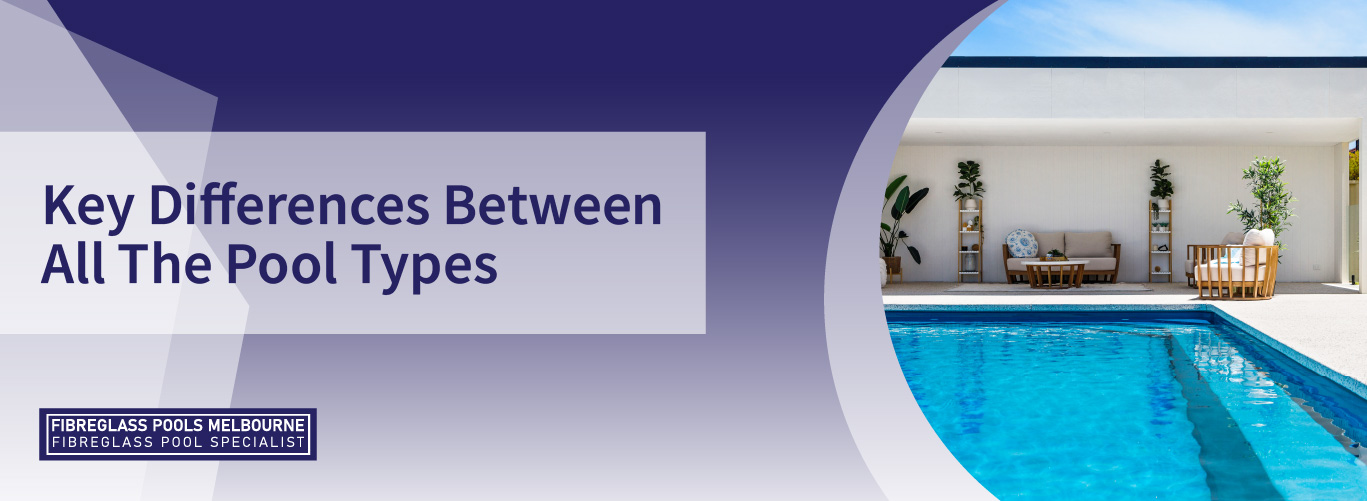
In-ground vs. Above-ground Pools
Installation
One of the first decisions you’ll need to make is whether to go for an in-ground or an above-ground pool. In-ground pools involve extensive excavation and are permanently installed into the ground. This makes them a more complex and time-consuming project but provides a seamless look that can integrate beautifully with landscaping. In contrast, above-ground pools are simpler to install, requiring no excavation. They are typically assembled on top of your existing lawn or patio area. This means the installation process is much faster, often taking just a few days, and easier to manage.
Longevity
When it comes to longevity, in-ground pools often have the edge. Properly maintained, they can last a lifetime, making them a long-term investment. Above-ground pools, however, typically have a lifespan of 7 to 15 years, depending on the materials used and how well they are maintained.
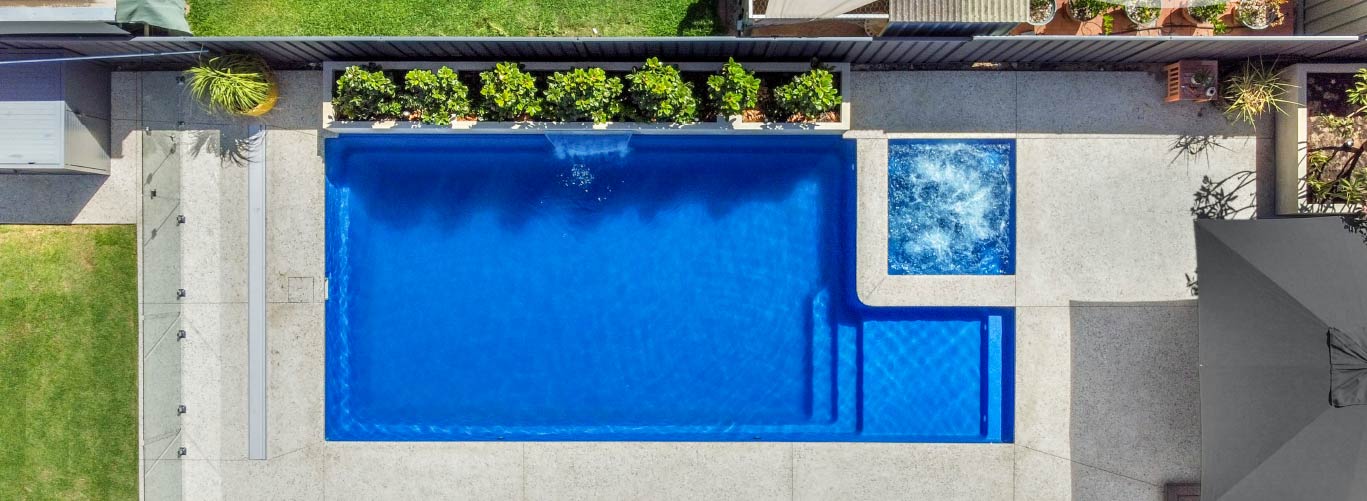
Concrete vs. Fiberglass vs. Vinyl Liner Pools
Construction
Concrete pools offer the highest level of customization. They can be built in any shape or size, allowing for unique designs. However, they require a longer construction period, usually taking 3 to 6 months to complete.
Fibreglass pools are pre-moulded and arrive at your home ready to be installed. Unlike concrete pools, they only take a couple of weeks to install. The downside is that customization options are limited to the shapes and sizes available from the manufacturer.
Vinyl liner pools consist of a custom-made sheet of vinyl between the water and the pool structure. They offer a wide range of design options and can also be installed relatively quickly, usually within a few weeks.
Maintenance
Concrete pools require more maintenance than fibreglass and vinyl liner pools. The porous nature of concrete makes it prone to algae growth, necessitating regular cleaning and chemical treatment. They also need to be resurfaced every 10 to 15 years.
Fibreglass pools, on the other hand, have a smooth, non-porous surface that inhibits algae growth, making them easier to maintain. They are also less likely to require repairs or resurfacing over time.
Vinyl liner pools fall somewhere in between. The liners last about 5 to 10 years before needing replacement. While the surface is relatively smooth, it can be more susceptible to tears and punctures, which will require patching or replacing.
Customization
When it comes to customization, concrete pools reign supreme. You can design them in any shape, size, or depth, and incorporate features like built-in spas, waterfalls, and custom lighting.
Fibreglass pools offer fewer customization options, but they do come in a variety of pre-designed shapes and sizes, including freeform and kidney shapes. Most manufacturers offer a range of colour options and built-in features like steps and benches.
Vinyl liner pools provide a good balance between customization and cost. While the basic structure is usually rectangular, you can add features like steps, benches, and custom patterns for the liner itself.
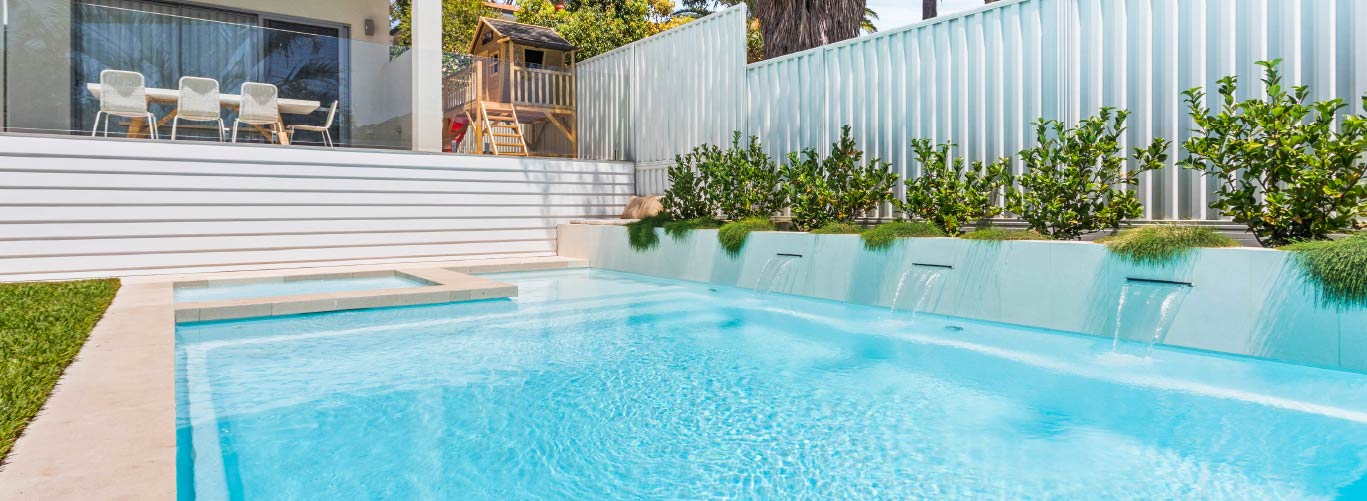
Saltwater vs. Chlorine Pools
Water Quality
One of the most significant decisions you’ll need to make is whether to opt for a saltwater or chlorine pool. Saltwater pools use a salt chlorinator to convert salt into chlorine, thereby maintaining water quality. They offer softer water, which is gentle on the skin and eyes.
Chlorine pools, on the other hand, require regular addition of chlorine tablets or liquid to keep the water clean. While effective, traditional chlorine can sometimes cause irritation to the skin and eyes, particularly if not balanced correctly.
Maintenance
Saltwater pools generally require less maintenance because the salt chlorinator continuously produces chlorine, reducing the need for manual addition. However, the salt cell will need periodic cleaning and eventual replacement every 3 to 7 years.
Chlorine pools need regular monitoring and balancing of chemical levels. This involves adding chlorine and other chemicals to maintain optimal water quality. While this requires more hands-on effort, the chemicals are readily available and relatively inexpensive.
Health Considerations
From a health perspective, saltwater pools are often considered better. The lower chlorine levels are less harsh on the skin and eyes, and the water feels smoother. They are also less likely to cause allergic reactions or sensitivities.
Chlorine pools, while highly effective at killing bacteria and algae, can sometimes lead to respiratory issues or skin irritation, especially if the pool is not properly balanced. It’s important to monitor chlorine levels and maintain proper hygiene to minimise these risks.
Conclusion
Choosing the right pool for your home is a significant decision that involves various factors including cost, maintenance, and personal preferences. From the installation and cost differences between in-ground and above-ground pools to the customization options provided by concrete, fibreglass, and vinyl liner pools, each choice offers unique benefits and considerations.
The debate between saltwater and chlorine pools adds another layer of complexity, with each option presenting its own set of advantages and maintenance requirements. Ultimately, the best pool for you will depend on your specific needs, budget, and long-term plans for your property.
We hope this guide has provided valuable insights into the key differences between all the pool types available. Remember to consider your priorities and consult with professionals to make the most informed decision.
Key Differences Between All The Pool Types
When it comes to adding a swimming pool to your home, the choices can seem endless and overwhelming. Not only is a pool an investment, but it's also a significant addition to your lifestyle and property. Picking the right type of pool is crucial to ensure it meets your needs, fits your budget, and adds value to your home. In this blog post, we will explore the key differences between various pool types, helping homeowners make an informed decision. We'll cover everything from in-ground versus above-ground pools to comparing construction materials like concrete, fibreglass, and vinyl liners. We'll also delve into the water quality debate—saltwater versus chlorine pools. By the end of this blog, you'll have a solid understanding of the different pool types available and what might work best for your home.
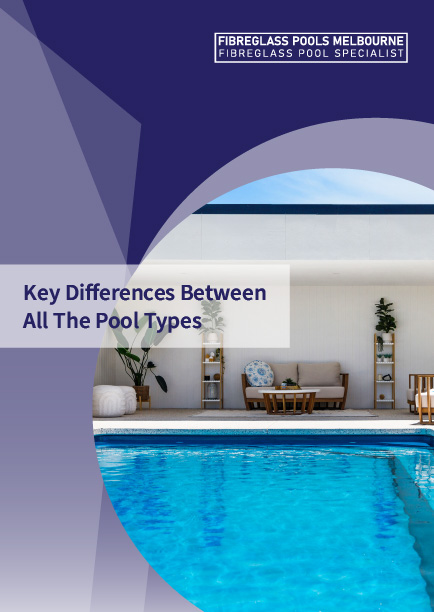
In-ground vs. Above-ground Pools
Installation
One of the first decisions you’ll need to make is whether to go for an in-ground or an above-ground pool. In-ground pools involve extensive excavation and are permanently installed into the ground. This makes them a more complex and time-consuming project but provides a seamless look that can integrate beautifully with landscaping. In contrast, above-ground pools are simpler to install, requiring no excavation. They are typically assembled on top of your existing lawn or patio area. This means the installation process is much faster, often taking just a few days, and easier to manage.
Longevity
When it comes to longevity, in-ground pools often have the edge. Properly maintained, they can last a lifetime, making them a long-term investment. Above-ground pools, however, typically have a lifespan of 7 to 15 years, depending on the materials used and how well they are maintained.
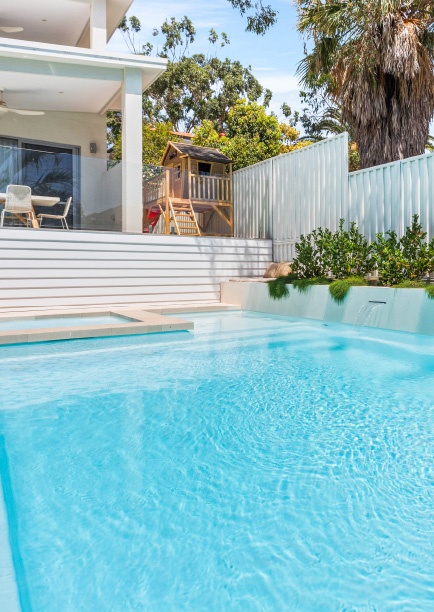
Concrete vs. Fiberglass vs. Vinyl Liner Pools
Construction
Concrete pools offer the highest level of customization. They can be built in any shape or size, allowing for unique designs. However, they require a longer construction period, usually taking 3 to 6 months to complete.
Fibreglass pools are pre-moulded and arrive at your home ready to be installed. Unlike concrete pools, they only take a couple of weeks to install. The downside is that customization options are limited to the shapes and sizes available from the manufacturer.
Vinyl liner pools consist of a custom-made sheet of vinyl between the water and the pool structure. They offer a wide range of design options and can also be installed relatively quickly, usually within a few weeks.
Maintenance
Concrete pools require more maintenance than fibreglass and vinyl liner pools. The porous nature of concrete makes it prone to algae growth, necessitating regular cleaning and chemical treatment. They also need to be resurfaced every 10 to 15 years.
Fibreglass pools, on the other hand, have a smooth, non-porous surface that inhibits algae growth, making them easier to maintain. They are also less likely to require repairs or resurfacing over time.
Vinyl liner pools fall somewhere in between. The liners last about 5 to 10 years before needing replacement. While the surface is relatively smooth, it can be more susceptible to tears and punctures, which will require patching or replacing.
Customization
When it comes to customization, concrete pools reign supreme. You can design them in any shape, size, or depth, and incorporate features like built-in spas, waterfalls, and custom lighting.
Fibreglass pools offer fewer customization options, but they do come in a variety of pre-designed shapes and sizes, including freeform and kidney shapes. Most manufacturers offer a range of colour options and built-in features like steps and benches.
Vinyl liner pools provide a good balance between customization and cost. While the basic structure is usually rectangular, you can add features like steps, benches, and custom patterns for the liner itself.
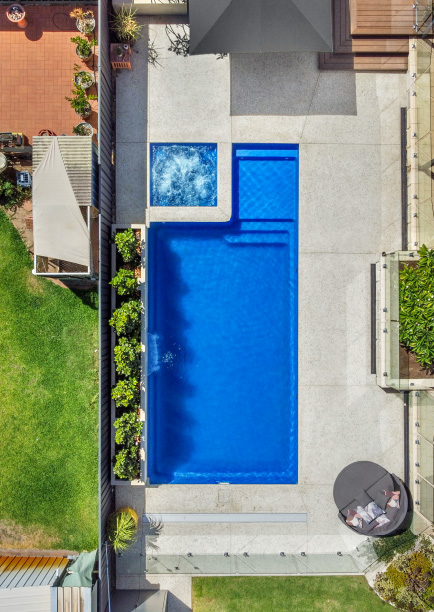
Saltwater vs. Chlorine Pools
Water Quality
One of the most significant decisions you’ll need to make is whether to opt for a saltwater or chlorine pool. Saltwater pools use a salt chlorinator to convert salt into chlorine, thereby maintaining water quality. They offer softer water, which is gentle on the skin and eyes.
Chlorine pools, on the other hand, require regular addition of chlorine tablets or liquid to keep the water clean. While effective, traditional chlorine can sometimes cause irritation to the skin and eyes, particularly if not balanced correctly.
Maintenance
Saltwater pools generally require less maintenance because the salt chlorinator continuously produces chlorine, reducing the need for manual addition. However, the salt cell will need periodic cleaning and eventual replacement every 3 to 7 years.
Chlorine pools need regular monitoring and balancing of chemical levels. This involves adding chlorine and other chemicals to maintain optimal water quality. While this requires more hands-on effort, the chemicals are readily available and relatively inexpensive.
Health Considerations
From a health perspective, saltwater pools are often considered better. The lower chlorine levels are less harsh on the skin and eyes, and the water feels smoother. They are also less likely to cause allergic reactions or sensitivities.
Chlorine pools, while highly effective at killing bacteria and algae, can sometimes lead to respiratory issues or skin irritation, especially if the pool is not properly balanced. It’s important to monitor chlorine levels and maintain proper hygiene to minimise these risks.
Conclusion
Choosing the right pool for your home is a significant decision that involves various factors including cost, maintenance, and personal preferences. From the installation and cost differences between in-ground and above-ground pools to the customization options provided by concrete, fibreglass, and vinyl liner pools, each choice offers unique benefits and considerations.
The debate between saltwater and chlorine pools adds another layer of complexity, with each option presenting its own set of advantages and maintenance requirements. Ultimately, the best pool for you will depend on your specific needs, budget, and long-term plans for your property.
We hope this guide has provided valuable insights into the key differences between all the pool types available. Remember to consider your priorities and consult with professionals to make the most informed decision.


